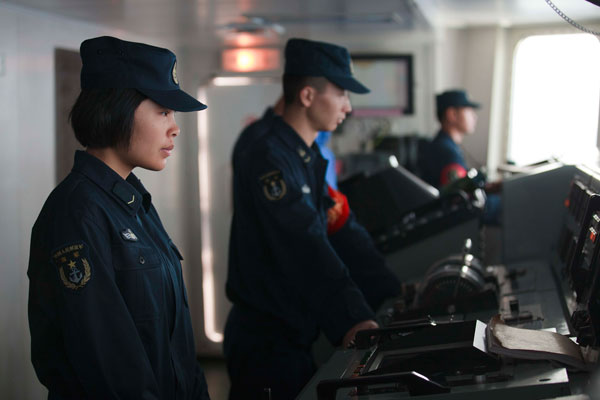Dreams come true for female sailors
|
Ma Yan, a helmswoman on the Lanzhou, steers the ship during an ongoing training mission of the South Sea fleet of the PLA. Wang Qi / for China Daily |
After serving nearly eight months on guided missile destroyer Lanzhou, China's first group of female sailors on combatant ships said they are witnessing their childhood dreams coming to reality.
"I had always dreamed of becoming a People's Liberation Army soldier when I was a little girl," Zhang Lu, a 24-year-old woman from Hubei province, said on the destroyer.
Zhang had closely followed news about the PLA's recruitment since she entered Hubei University of Technology in 2006, hoping to find an opportunity of becoming a servicewoman.
"I couldn't make it because I studied international economics and trade in the university, and my curriculum seemed a little bit far from what is needed by the PLA," she said.
"My first attempt to enlist in the PLA failed in 2009. My mother had called me to say the military was recruiting servicewomen," the electronic signal operator said, adding that after her graduation in July 2010, she landed a job at a bank in Guangdong province but the dream of becoming a soldier did not vanish.
Six months later she tried again and, this time, she succeeded.
In August, the PLA navy decided to give servicewomen posts on combatant ships and launched a trial project on selected vessels from its three fleets - the North Sea Fleet, East Sea Fleet and South Sea Fleet, which Zhang has been serving in.
After passing through a series of tests, she was chosen and assigned to the Lanzhou.
"I am working at the signal position, which requires attention, flexibility and good communication skills," Zhang said, adding she has got accustomed to the life on the sea and is striving to improve her work capability.
The destroyer on which Zhang is serving is taking part in a large-scale, far-reaching patrol-training mission by the South Sea Fleet to the South China Sea and Western Pacific Ocean.
"I feel very proud and excited that I am participating in the mission. It will be an invaluable experience, and I am convinced that I can learn a lot from this mission."
Zhang's excitement was shared by one of her peers in the sonar cabin, Wei Ting, a 22-year-old from Lanzhou, the capital of Gansu province.
"Last night I couldn't fall asleep because I was aware my colleagues were working hard on the sonar searching for submarines," she said.
Wei said her post is like the ears of the battleship, adding she has heard dolphins singing and the sounds of passing pods when she was on duty.
"I come from Lanzhou, after which the ship is named, therefore when I am missing my hometown I come to the conference room to look at the pictures of the city hung there."
In addition to homesickness, seasickness is another challenge the young sailors have to overcome.
"When I first boarded the ship, I suffered a lot from seasickness," said Ma Yan, who is also 22 and comes from Heilongjiang province. "I was not the only one that had to endure nausea and loss of appetite."
The helmswoman continued: "Fortunately, we have gotten over this problem after a lot of training."
There are 16 servicewomen serving in five sections on Lanzhou, among them 13 university graduates, said Wang Min, political commissar of the destroyer.
"We are among the first servicewomen to serve on our navy's combatant ships so we must set a good example and prove that women are also capable of assuming important tasks in the military," said Xiong Jing, 27, chief of the destroyer's servicewomen squad.
zhaolei@chinadaily.com.cn



















